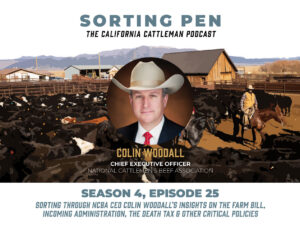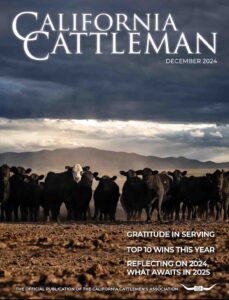
CALIFORNIA CATTLEMAN WEEKLY
December 23, 2024
To read the full version each week, please subscribe below.
Governor Newsom Proclaims State of Emergency Regarding Bird Flu
Governor Gavin Newsom on Wednesday proclaimed a state of emergency “to exist statewide due to Bird Flu.” While all detections of Bird Flu in the state until recently had been confined to “nine California counties limited to Central California,” the proclamation notes that “on December 12, 2024, dairy cows at four Southern California dairies tested positive for Bird Flu, necessitating a shift from regional containment to statewide monitoring and response to active cases.”
A release from the Governor’s office states that “This proclamation is a targeted action to ensure government agencies have the resources and flexibility they need to respond quickly to this outbreak.” To facilitate that flexibility and rapid response, the proclamation suspends various state laws governing agencies’ contracting obligations, equipment procurement procedures and employee work time.
The release also notes that the state of emergency is intended to further extend California’s commitment to “protecting public health, supporting our agriculture industry, and ensuring that Californians have access to accurate, up-to-date information.”
CCA will keep members apprised of the Bird Flu state of emergency and any impacts to beef cattle operations. To date, there have been no detections of Bird Flu in the state’s beef herd.
CDFW Issues Gray Wolf Depredation Reports
The California Department of Fish and Wildlife on Friday announced the release of 14 depredation investigation reports covering the period from Oct. 24 to Nov. 28. Of the 14 reports, 12 were deemed confirmed depredations of livestock by wolves. One suspected depredation – an injured calf on Tule River Tribe Reservation lands within Yowlumni Pack territory – was deemed “probable” and the cause of injuries to two heifers on Nov. 5 in Sierra County was classified “unknown.”
While CDFW’s announcement states that “Four of the confirmed determinations are a result a new pair of wolves in Lassen County,” five of the newly-posted depredation reports attribute livestock kills to a “new pair” in “Southern Lassen County” (represented as a red circle in southern Lassen County on the Department’s most recent “Approximate Area of Gray Wolf Activity” map). Of the seven remaining confirmed depredations, four were attributed to the Whaleback Pack in Siskiyou County, two to the Harvey Pack in Lassen and Shasta counties, and one to the Yowlumni Pack in Tulare County.
In 2024 alone, CDFW has confirmed at least 56 livestock lost to wolf depredations across 50 attacks.
USDA Announces FY 2025 Availability of EID Tags for Producers
USDA’s Animal and Plant Health Inspection Service (APHIS) announced last week that the agency “will make a one-time purchase to provide States with an additional 3 million [electronic identification] tags at no cost to the States or producers to support the industry during the first year of implementation” of a new Animal Disease Traceability rule which went into effect on Nov. 5. For information on obtaining EID tags from the California Department of Food and Agriculture, see the “Electronic Identification (EID) Eartags for Cattle and Bison” section of CDFA’s Animal Disease Traceability webpage. For additional information and resources regarding the new Animal Disease Traceability rule, see CCA’s guide to “What to Know About the Cattle Traceability Rule Going into Effect Nov. 5.”
CCA Sues to Halt Removal of Elk Exclusion Fence at Point Reyes National Seashore
Earlier this month, CCA sued the National Park Service (NPS) to halt the removal of an eight-foot-tall fence that excludes a large herd of Tule elk within the Tomales Point area of the Point Reyes National Seashore from the “Pastoral Zone” where beef ranchers and dairy farmers raise cattle. Elk damage to ranches and cattle herds at Point Reyes is significant and well-documented. At a Dec. 6 hearing in the case, the NPS agreed to stop removal pending further hearings in the case, though roughly 850 feet of the 2.2-mile fence had already been removed. Further hearings in the case are not expected until mid-February. For additional details, see the December 9 edition of California Cattleman Weekly or the forthcoming January edition of the California Cattleman magazine.
Federal Court Enjoins Enforcement of the Corporate Transparency Act
Earlier this month, a judge for the United States District Court for the Eastern District of Texas issued a nationwide injunction halting enforcement of the Corporate Transparency Act (CTA), finding that the Act and the Reporting Rule implementing it were “likely unconstitutional as outside of Congress’s power” and prohibiting enforcement of the January 1 enforcement date. As previously reported by CCA, the CTA would require many farms and ranches with 20 or fewer employees to file “beneficial ownership information” with the U.S. Department of the Treasury’s Financial Crimes Enforcement Network (FinCEN). As a result of the injunction, FinCEN is currently prohibited from enforcing the January 1, 2025 filing deadline. For additional details, see the December 9 edition of California Cattleman Weekly.
NCBA Launches New World Screwworm Resources
From the National Cattlemen’s Beef Association
The National Cattlemen’s Beef Association (NCBA) has launched a web page dedicated to sharing information on the New World screwworm, an emerging cattle health threat. The page will be updated frequently as new information becomes available. To view the page, click here.
2024-25 Agricultural Vehicle, Equipment, and Infrastructure Survey
From the California Air Resources Board
The California Air Resources Board (CARB), California Energy Commission (CEC), and California Public Utilities Commission (CPUC), with the support of the California agricultural community, is requesting your participation in a new 2024-25 Agricultural Vehicle, Equipment, and Infrastructure Survey.
Results from the previous survey informed the distribution of hundreds of millions of dollars of subsequent incentive funding across California, including state, federal and regional incentive programs. This new survey will continue to support these incentive programs, air quality planning efforts at CARB, and can help inform energy and infrastructure planning at CEC and CPUC.
The 2024-25 agricultural survey covers all on-road vehicles and off-road agricultural equipment of all fuel types, including electric equipment, used by producers in the field, custom operators, and first processing facilities.
CARB has contracted Cal Poly San Luis Obispo to handle and completely anonymize all survey data, which includes removal of all identifying information. Just as with the previous survey, all responses are completely confidential and identifying information will never be seen by CARB, CEC, CPUC, or any government body. Cal Poly will administer a web-based survey, linked below, and may be completed on a computer or phone in just a few minutes. As a new option this year, a Spanish-version of the survey will be available in January.
Surveys must be submitted by February 21, 2025. Please contact us with any questions or comments. To take the survey, click here.
Upcoming CCA Events
2025 Feeder Meeting
May 21-22, Hilton San Diego Bayfront, San Diego, CA
The room block for 2025 Feeder Meeting is now open! Feeder Meeting will take place May 21 – 22. To book your stay at the Hilton San Diego Bayfront, click here. Check back in the coming weeks for additional details and registration information.
Upcoming Industry Events
UCCE & UC Davis Veterinary Medicine Cattle Health Webinar Series
Tuesdays, 5:30 – 7:00pm, Month of January, Virtual
Join the University of California Cooperative Extension (UCCE) and UC Davis Veterinary Medicine for the 2025 Cattle Health Webinar Series! The series of free online webinars for cattle producers will take place every Tuesday evening in January from 5:30 – 7:00pm. The series will cover topics important to cattle health and management and will be held live so participants have the opportunity to ask questions. Below find the webinar series schedule.
These webinars are FREE to participate but registration is required. to register, click here.
Neonatal and Juvenile Diarrhea in Beef Calves
Jan. 7, 5:30 – 7:00 pm
Grace VanHoy, DVM, MS, DACVIM-Assistant Professor, UC Davis School of Veterinary Medicine.
Beef Cattle Respiratory Prevention and Treatment
Jan. 14, 5:30 – 7:00 pm
Munashe Chigerwe, BVSc, MPH, PhD, DACVIM, professor, UC Davis School of Veterinary Medicine.
Biosecurity at the Ranch: Foot and Mouth Disease, Avian Influenza and More
Jan. 21, 5:30 – 7:00 pm
Gaby Maier, Ph.D., DVM, Assistant Specialist in Cooperative Extension, UC Davis School of Veterinary Medicine.
Common Cattle Foot Issues
Jan. 28, 5:30 – 7:00 pm
Meera Heller, DVM, PhD, DACVIM Professor, UC Davis School of Veterinary Medicine.
UCCE Offers AB 589 Water Measurement and Reporting Course
Jan. 30, 9:00am-12:30pm, UCANR Building, 2801 2nd Street, Davis, CA
The University of California Cooperative Extension (UCCE) will offer a water measurement and reporting course, as authorized by CCA-sponsored AB 589 (2017) and SB 880 (2022), on Thursday, January 30. Registration is $35 and pre-registration is required. For additional details and to register for the training, click here or contact Larry Forero or Sara Jaimes.
2025 CattleCon
Feb. 4 – 6, Henry B. Gonzalez Convention Center, San Antonio, TX
2025 CattleCon is headed to San Antonio! To register, view a tentative schedule and for additional information click here.
CCA in the News
The Viewpoint with Kirk Wilbur Western Livestock Journal “Kirk Wilbur’s path to becoming vice president of government affairs at the California Cattlemen’s Association (CCA) was anything but conventional. Kirk entered the agricultural policy field not through agriculture or ranching experience, but with a background in history and political science from Gonzaga University in Spokane, WA, and a law degree specializing in intellectual property from the McGeorge School of Law in Sacramento, CA. ” To continue reading, click here.
Industry News
House passes a funding bill, averts shutdown Brownfield Ag News “The U.S. House of Representatives overwhelmingly passed a bill to keep the government open, provide financial aid to farmers, and extend the farm bill for one year.” To continue reading, click here.
Fish & Wildlife Service Withdraws BIDEH Wildlife Refuge Proposal Northern Ag Network “‘The [Biological Integrity, Diversity, and Environmental Health] rule was a completely misguided approach to management of the National Wildlife Refuge System,’ said Water, Wildlife and Fisheries Subcommittee Chairman Cliff Bentz (R-Ore.) ‘The rule would have imposed bureaucratic nightmares on refuge managers and opened the door for a wave of anti-farmer and rancher litigation. Under the proposed rule, normal and historic management tools, such as grazing, planting crops, and native predator control, would have required a full NEPA review prior to implementation. This would have severely restricted the discretion of refuge managers and putting at risk the very purpose of individual refuges. I welcome the withdrawal of the rule and will continue to push back on policies that put politics over practical management.’” To continue reading, click here.
A new episode of Sorting Pen: The California Cattleman Podcast is out now! In this week’s episode, National Cattlemen’s Beef Association CEO Colin Woodall joins Katie on the final episode of Sorting Pen Season 4. Tune in to hear Colin share about the status of the Farm Bill, how NCBA feels about some of the nominations that have been made by the incoming Administration, why taxes are a priority for NCBA and much more as we look ahead to a new Congress starting on Jan. 3. To listen, click here.



